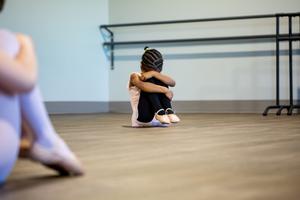What if we could break our child’s anxious thinking patterns by asking a few consistent but curious questions? What if we could help our children to reframe challenges in their word, by asking them to be curious, and exploring emotions with them? What if we could break patterns, create new neural pathways and pause for reflection with our children?
We can, and it’s called curious parenting.
Parent-led cognitive behavioural therapy (CBT) for child anxiety is an effective way of changing patterns of thinking. When we feel anxious, we can get trapped in cognitive distortions. That is, we perceive the world a certain way, that may not be objectively true. An example is catastrophic thinking:
“First my favourite jumper had a hole in it, now it’s raining and I’ve forgotten my umbrella – This is the worst day of my life!”
Cognitive distortions can happen to our children too, and as the adult with the fully functioning psychological mind, it is up to us to help our children to break down these distortions by asking questions of them. This type of coaching will teach the child to challenge anxious behaviours and ask questions of their anxious feelings.
Enter curious parenting – A way to reduce child anxiety.
Help your child explore emotions and to unpack what they’re feeling. Teach them how to ask pertinent and incisive questions to challenge their anxious thoughts.
“I can hear that you sound really upset with the day you’ve had… But was it really the worst day of your life? You got to see your friend Amy. Can you think of any other good things about the day? What about the rain watering our new veggie garden?”
Asking incisive questions at the right moment can help our children to reframe anxious or stressful scenarios. It can also promote curiosity and a ‘have a go’ attitude in our kids. Doing this will better equip children for future challenges.
Curious parenting is just one tool in your arsenal for helping your child to manage their anxiety. It can, however, be a very effective tool in the right scenario. If you can coach your child by using curious questions regularly you can teach your child to do this themselves. Make sure that your child’s emotions are heard first, but then challenge them, in a curious and non-emotive manner, to reframe the scenario:
“Is that the only way of looking at it?” “I noticed that … “ “Can you think of another explanation?”
We can practise these skills first in non-emotive scenarios, like learning to bake a cake:
'What do we need for the ingredients?’ ‘Shall we write a list and go to the store?’ ‘Shall we follow the recipe steps?’ ‘What do we do next?’
The same method of thinking can then be effectively transferred to an emotional scenario.
In doing this, it is vital that we stay calm, let our children feel heard and then ask curious questions to help them to reframe the stressful scenario that they are experiencing.


